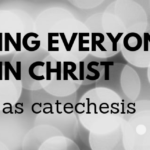We may be about to exit the European Union and begin a new relationship with our European neighbours and with the world. +Steven, +Alan, +Colin and Bishop-elect Olivia have written a joint letter to every church, school and chaplaincy in the Diocese of Oxford reminding us all of the important roles that our churches and schools hold at this time. The bishops are encouraging parishioners across the diocese to read the letter too: “Don’t underestimate what we can achieve if every church, chaplaincy and school does something and if every Christian disciple takes some action, however small”.
Dear friends,
Love your neighbour as yourself: a Christian response to Brexit
“But seek the welfare of the city where I have sent you… and pray to the LORD on its behalf, for in its welfare you will find your welfare” (Jeremiah 29.7)
We are writing as bishops to every church, school and chaplaincy in the Diocese of Oxford and to every disciple at this critical moment in our national life.
As a nation we may be about to exit the European Union and begin a new relationship with our European neighbours and with the world. At the time of writing, the course of events is uncertain – and the prolonged uncertainty is itself challenging. How are we to respond in the coming months as the Church of England across Oxfordshire, Berkshire, Buckinghamshire and Milton Keynes?
Six hundred years before the birth of Christ, the prophet Jeremiah wrote to those sent into exile in Babylon. His words resonate powerfully today. We are to seek the welfare of our cities, towns and villages in these difficult months. The word translated welfare here is shalom: peace, well-being and prosperity. These must be our goal.
There are over a thousand churches, schools and chaplaincies in the Diocese of Oxford and over 50,000 regular worshippers. We are calling on everyone to remember the commandment to love our neighbours as ourselves, especially in the coming weeks. Together we can make a significant difference.
The Church of England and Brexit
Our nation is divided about our future relationship in Europe. Our calling as the Church in these times is not to take sides in this debate but to continue to be the Church for everyone. There are leavers and remainers in every congregation, but this can never be our primary identity as Christians.
We have a particular responsibility at this time to speak out for the poorest in our communities and to act to help them (as the church has always done). We have a responsibility to work for the peace and the common good. We are called to offer in public and in private a voice of truth and a voice for hope in the future. The Bishops of the Church of England made a public statement recently calling for listening, respect and renewal in political life.
As the Church we bring a long perspective on the present debates. We know from our own history that the United Kingdom has re-imagined its relationship with Europe many times in the past. The Church of England came into existence as part of one of these eras of change. In a few weeks, we will all remember again those who gave their lives in the great wars of the twentieth century which were focussed around conflict across Europe.
As the Church, our friendships with Europe and with the Church across Europe will continue and deepen whatever the political and economic settlement.
What can we do?
National and local government have done a great deal to plan for a smooth and orderly Brexit (with or without a deal). However, there is an important role at this time for practical expressions of love and hope by communities and individuals. The exact needs will vary from one parish or benefice to another. These are some of the things you may need to consider and think about as Church Councils, school governing bodies, small groups and families.
Twelve ways to love your neighbour as yourself, a Brexit checklist:
- Give extra support to the food banks in your area. There may be temporary shortages of some foods. Prices may rise. Foodbank usage may also rise. Signpost your local foodbank. Make sure stocks are high, and there are enough volunteers.
- Watch out for the lonely, the anxious and the vulnerable. Levels of fear are rising and may rise further. Knock on your neighbours doors and check if they are OK. Speak to people on the bus and at work. Build networks and friendships.
- Reach out to EU nationals in your neighbourhood and workplace. This is a moment for friendship and hospitality and love for the stranger. As we leave the European Union, or as the uncertainty continues, people are likely to feel less welcome.
- Make sure people have access to good advice on migration and travel, and qualified advice on debt and financial support. It may be possible to set up a temporary drop-in centre in Church for EU citizens or for UK citizens anxious about relatives abroad. Point people to relevant websites.
- Remember the needs of children and young people. Our schools and churches can be a place of balance and sanctuary for our children, who may be feeling upset and anxious. The Mental Health Foundation has excellent advice on talking to children about scary world news. Parents and teachers might want to use this as an opportunity to demonstrate how different media cover the same story.
- Support the statutory services. A lot of good, solid planning has been done by local authorities. Familiarise yourself with your local authority plans and point people to them. Meet with your local councillors and neighbourhood police officers.
- Think about the needs of particular groups in your area. Some parts of the diocese have large communities of migrant workers from a particular region. Other parts will want to focus on the farming industry and its need for seasonal workers. What are the local challenges where you live?
- Work together with other churches, faith communities and charities. There are some excellent examples of collaboration across the Diocese in foodbanks, debt counselling and night shelters. How else could we work in partnership?
- Invite the community together. Encouraging discussion about the rights and wrongs of Brexit is unlikely to be helpful. Gather people to listen to each other about what concerns them looking forward and how communities can be brought together despite acknowledged differences. Gatherings over a meal can be helpful as can skilled facilitation.
- Watch over other faith and minority ethnic communities. Hate crimes and crimes against other faiths increased after the 2016 referendum. Reconnect with the mosques, synagogues and gudwaras in your area.
- Encourage truthful and honest debate. The renewal of our politics will need to be local as well as national. Plan now to host hustings during the General Election campaign. Don’t be afraid of the political space but step into it with a message of faith, hope and love.
- Pray in public worship and private prayer for the healing of our political life, for wisdom for those who lead us, for reconciliation between communities and for stability in our government.
Don’t underestimate what we can achieve if every church, chaplaincy and school does something and if every Christian disciple takes some action, however small.
Don’t take on too much either: loving our neighbour through the Brexit process needs to be woven into everything we do anyway, not simply added into busy lives. Don’t be limited by this checklist – you might have even better ideas. If you do, spread them around.
There are more details and resources in a special section on the Diocesan website, where you can download “Twelve ways to love your neighbour” as a poster.
Together we are called to be a contemplative, compassionate and courageous church, to love our neighbours as ourselves in the months ahead and to pray and work for the wellbeing of our communities.
+Steven Oxford
+Colin Dorchester
+Alan Buckingham
Olivia, Bishop of Reading elect
7 October 2019


